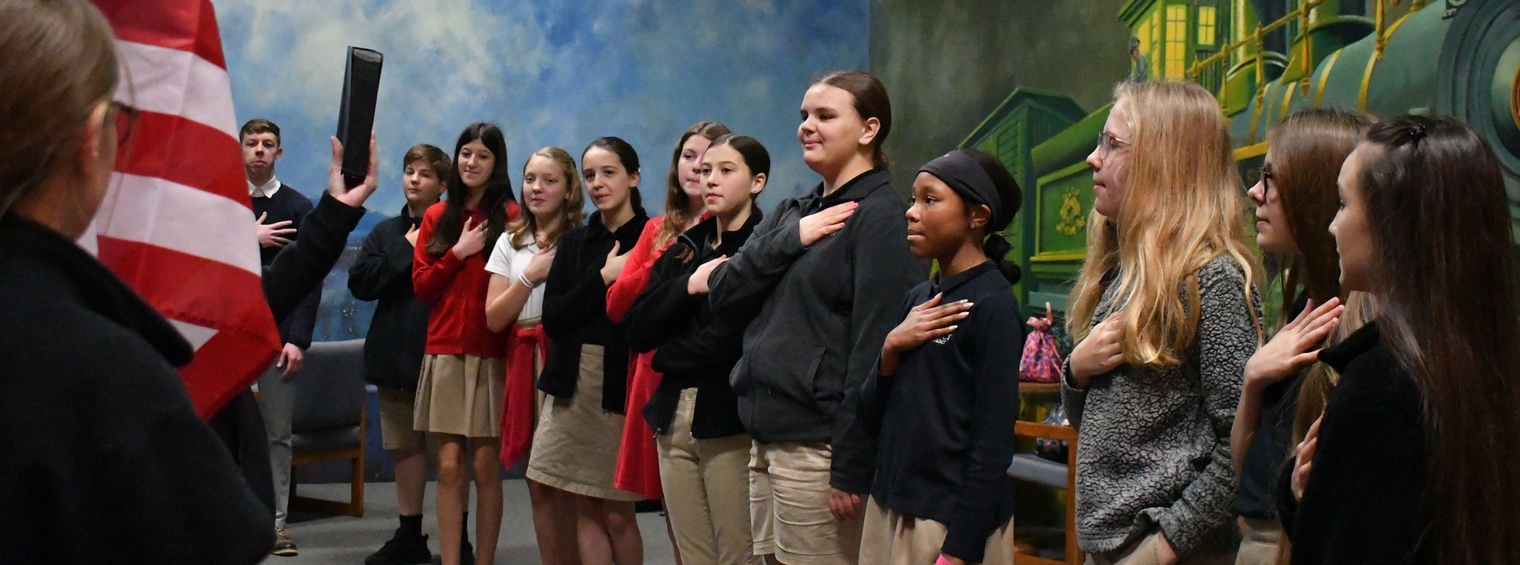

Our faith is not taught alongside our curriculum.
Our faith is the framework for learning.
It is the lens through which our students see and discover.
CLASSICAL STUDIES
Classical Studies is the natural companion to Latin. In classical studies, students study Greek mythology and Greek and Roman history and literature every year, gradually deepening their knowledge and understanding. This long grounding prepares students to read the classics of Greek, Roman, and English literature, and to study and understand the modern world.
Classical Studies Suggested Timeline
Year 1: D’Aulaires’ Greek Myths
Year 2: Famous Men of Rome
Year 3: Famous Men of the Middle Ages
Year 4: Famous Men of Greece, The Trojan War, and Horatius at the Bridge
Year 5: Iliad, Odyssey, and The Book of the Ancient Greeks
Year 6: The Aeneid and The Book of the Ancient Romans
Year 7: Greek Plays (Euripedes, Sophocles, and Aeschylus)
Year 8: The Divine Comedy (Dante)
Click here for Memoria Press Classical Curriculum
CLASSICAL EDUCATION RESOURCES
Click the links below for additional Classical Education resources:
The Myth Made Facts
Athens and Jerusalem
What is Western Civilization?
Christianity and Culture as the Basis for American Civilization
Why Should Christians Read the Pagan Classics
The Necessity of the Classics
The Classical Education of the Puritans
The Indispensable Classics of Classical Education
Why Read Homer's Iliad?
CHRISTIAN STUDIES
The Memoria Press Christian Studies program is designed to develop three things: Bible literacy, knowledge of church history, and a strong faith and Christian consciousness. To achieve this, your student will study Scripture in K-6, church history in grades 7-11, and Christian apologetics in grade 12. Christian Studies is an academic course equal in content and examinations to all other areas of the curriculum. Our beliefs are the Christian faith is true and that both reason and history support this belief. All time is dated from the birth of Jesus Christ, the central figure in human history. Our program helps students understand why this is true.
Memoria Press Curriculum Design
Christian Studies I: All Major Bible Stories up to the Entry into Canaan
Christian Studies I is part of a three-year reading course that builds faith by teaching Salvation History as real history. Students work through one-third of The Golden Children’s Bible each year, for three years. Your child will learn the fundamentals of Bible stories, history, and geography, with solid detail at a manageable pace.
Christian Studies II: The Rise and Fall of Israel, the Period of the Prophets
Christian Studies II is the second book in a three-year reading course that builds faith by teaching Salvation History as real history. Students work through one-third of The Golden Children’s Bible each year, for three years. Your child will learn the fundamentals of Bible stories, history, and geography, with solid detail at a manageable pace.
Christian Studies III: All Major New Testament Stories
Christian Studies III is the last book in a three-year reading course that builds faith by teaching Salvation History as real history. Students work through one-third of The Golden Children’s Bible each year, for three years. Your child will learn the fundamentals of Bible stories, history, and geography, with solid detail at a manageable pace.
The Old and New Testament Flashcards help your student become versed in the central facts of the Bible to assure that your student is Biblically literate. The Memory Verse Flashcards will ground your student in the key verses of the bible in a way that will not only enable them to learn Biblical teachings, but that will form their minds as they become adults.
Memoria Press Christian Studies Curriculum
CHRISTIAN STUDIES RESOURCES
Click the links below for additional Classical Studies resources:
What is a Christian Worldview?
Twelve Great Christian Novels
The Religious Roots of “Child-Centered” Education
LATIN at Legacy
Memoria Press’ award-winning Latin programs are designed to teach your student to master the Latin grammar through an easy to use, step-by-step process that brings out the logical and systematic nature of this language, the mother tongue of Western civilization. In studying Latin, your student will gain an academic vocabulary, a mastery of English grammar, and will develop the critical thinking skills that come from the study of a complex, inflected grammar. A powerful mind-expander, Latin benefits students as it:
- Increases English vocabulary and enhances understanding of English grammar
- Teaches precision and analytical skills
- Provides a foundation for the study of other modern languages
- Exposes students to the terminology of science, law and theology
- Improves student performance on the verbal portion of ACTs/SATs
- Strengthens math skills
- Increases appreciation of Western civilization and its Greco-Roman roots.
Memoria Press Latin Curriculum
LATIN STUDY RESOURCES
Click the links below for additional Latin resources:
Taking the Time to Translate
How Latin Builds Vocabulary
The Language of Learning
The Language that Rose from the Dead
The Justification for Latin
Lost in Translation
How Latin Develops the Mind
In Defense of Latin
Why Latin is Not Optional
Unlocking the Treasure Chest of Latin
The Short History of Latin Pronuciation
Latin: The Basic Subject
Why Study Latin and Greek
Why Study Latin?
